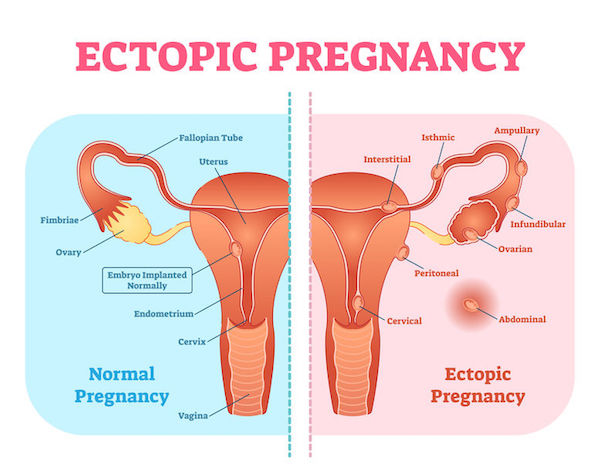An ectopic pregnancy is a pregnancy complication where the fertilised egg implants outside the uterus.

An ectopic pregnancy occurs when the embryo fails to implant in the uterine cavity, usually staying instead in the fallopian tube between the ovary and the uterus (also called a tubal pregnancy), or more rarely, implanting on the cervix, ovary or within the abdominal cavity.
One of the primary ectopic pregnancy causes is damage to or obstruction of the fallopian tube.
Ectopic pregnancy risk factors include:
- Use of an IUD (contraception by intrauterine device)
- A history of pelvic inflammatory disease (PID)
- Sexually transmitted diseases (STDs)
- Smoking
- Previous tubal surgery
- Previous ectopic pregnancy
There are between one and two ectopic pregnancies for every 100 live births.
What are its symptoms?
Ectopic pregnancy symptoms usually set in between six to eight weeks after the last menstrual period. Oftentimes the early signs of ectopic pregnancy are similar to those of a regular pregnancy, such as absent menstrual periods, nausea and breast tenderness.
Additional symptoms that may develop include:
- Pelvic or abdominal pain
- Vaginal bleeding or spotting
- Lightheadedness, signs of shock, low blood pressure or abdominal distension and severe pain may indicate the rupture of an ectopic pregnancy and should be treated as a medical emergency as it indicates heavy bleeding within the abdomen.
How is it diagnosed?
In women presenting with pelvic pain and vaginal bleeding, the addition of a positive pregnancy test may point towards an ectopic pregnancy. However, additional tests may be needed to confirm an ectopic pregnancy diagnosis.
A transvaginal pelvic ultrasound is used to create an image of the uterus and surrounding structures, so indicating if there is a mass in either of the fallopian tubes as well as the absence of an embryo from the uterine cavity.
Abnormal levels of the hormone beta HCG (human chorionic gonadotropin) can also indicate that an ectopic pregnancy may be present.
What are your treatment options?
Ectopic pregnancy treatment options may vary, depending on if it is suspected that the fallopian tube has ruptured or not. A raptured ectopic pregnancy is very serious, as it can lead to internal bleeding and shock, necessitating emergency surgery and the removal of the damaged tube and embryo.
If it has not ruptured, laparoscopic surgery may still be carried out to remove the embryonic tissue and, if possible, repair the fallopian tube.
When detected early enough, a drug called methotrexate can be used to induce miscarriage. The likelihood of successfully carrying an ectopic pregnancy to full term is so slim that this is never recommended as a possible course of action.
Can it be prevented?
There is no guaranteed way to prevent an ectopic pregnancy but you can take steps to decrease your risk. This includes being proactive about your sexual health in order to avoid infection or inflammation of the reproductive organs, and quitting smoking – a known risk factor for multiple complications during pregnancy.
IMAGE CREDIT: 123rf.com
